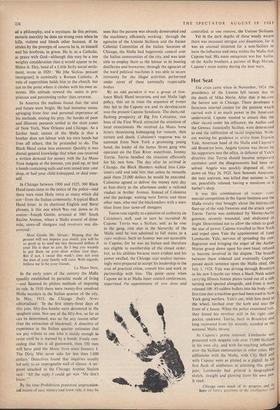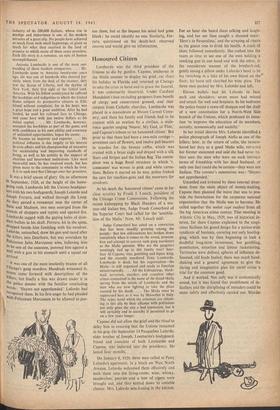Hot Seat
The crisis came when in November. 1924. the presidency of the Unione fell vacant due to the death of Mike Merlo. After that it became the hottest seat in Chicago. There developed a ferocious internal contest for the position wnich carried with it so much power in the American underworld. Capone wanted to ensure that the chair stayed under his influence; the Aiellos and the Gennas. fanatically Sicilian, were determined to end the infiltration of racial impurities. With- out waiting for guidance to arrive from Frankie Yale, American head of the Mafia and Capone's old Brooklyn boss, Angelo Genna was thrust by his supporters into the office, in defiance of Yale's directive that Torrio should become temporary caretaker until the disagreements had been re- solved. Angelo was quickly disposed of, shot down on May 26, 1925. Sam Samoots Amatuna, the next aspirant, was killed that autumn he sat, peacefully relaxed, having a manicure in a barber's shop.
It was this combination of %/totem com- mercial competition in the liquor business and the Mafia rivalry that brought about the internecine flare-up of the mid-Twenties and the attack upon Torrio. Torrio was ambushed by Moran-Aiello gunmen, severely wounded, and abdicated in fright. Determined not to allow the rebels to grab the seat of power, Capone travelled to New York and urged upon Yale the appointment of Tony Lombardo. Yale, nervous of spreading the con- flagration and bringing the anger of the Aiello- Moran group down upon his own head, refused to become involved in the dispute. The breach between them widened and eventually Capone passed death sentence upon the Mafia chief. Ott July I, 1928, Yale was driving through Brooklyn in his new Lincoln car when a black Nash sedan carrying Illinois licence plates raced out of a side turning and spurted alongside, and from it were released 100 .45-calibre bullets into his body —the first time that a machine-gun had been used in New York gang warfare. Yale's car, with him dead at the wheel, lurched over the kerb and into the front of a house. When the police examined him, they found his revolver still in his right coat pocket, undrawn. Torrio, back in Brooklyn and long recovered from hit wounds, acceded to the national Mafia throne.
As Capone's prime minister, Lombardo was presented with despotic rule over 15,000 Sicilians in his own city, and with far-reaching influence over the Sicilian communities in other cities. His affiliations with the Mafia, with City Hall and with Capone were as plaited as a pigtail. In his first flush of exaltation at attaining this proud post, Lombardo had printed a biographical sketch, straight and glowing from his own Pea' It read : Chicago owes much of its progress and itS, hope of future greatness to the intelligence and
industry of its 200,000 Italians, whose rise in prestige and importance is one of the modern miracles of a great city. No people have achieved so much from such small beginnings, or given so much for what they received in the land of promise to which many of them came penniless. Each life story is a romance, an epic of human accomplishment.
Antonio Lombardo is one of the most out- standing of these modern conquerors. . . . Mr. Lombardo came to America twenty-one years ago.,He was one of hundreds who cheered joy- ously, when, from the deck of the steamer, they saw the Statue of Liberty, and the skyline of New York, their first sight of the fabled land, America. With his fellow countrymen he suffered the hardships and indignities to which the United Slates, subjects its prospective citizens at Ellis Island without complaint, for in his heart was a great hope and a great ambition. After he had landed, he paid his railroad fare to Chicago, and came here with just twelve dollars as his initial capital. . . . Mr. Lombardo, however, accepted the hardships as part of the game, and with confidence in his own ability and assurance of unlimited opportunities, began his career. ... He became an importer and exporter. . . . His political influence is due largely to his interest in civic affairs and his championship of measures for maintaining and improving standards of living, as well as his activity in the support of charities and benevolent institutions. Like most successful men, he has received much, but has given more to the community in which he lives. It is to such men that Chicago owes her greatness.
It was a brief spasm of glory On an afternoon In September, 1928, at the height of the home- g°ing rush, Lombardo left the Unione headquar- ters with his two bodyguards, Joseph Lolordo and Joseph Ferraro, and walked through the Loop. As they passed a restaurant near the corner of State and Madison, two men emerged from the crowds of shoppers and typists and opened fire. Lombardo sagged with the gaping holes of dum- dum bullets in his skull. Ferraro, hit in the spine, dropped beside him fumbling with his revolver. Lolordo, untouched, drew his gun and raced after the killers into Dearborn, but was overtaken by Policeman John Marcusson who, believing him to be one of the assassins, jammed him against a Wall with a gun in his stomach until a squad car arrived.
It was one of the most insolently brazen of all Chicago's gang murders. Hundreds witnessed it; scores came forward with descriptions of the killers; but finally a line was drawn under it in the police dossier with the familiar concluding Words: `Slayers not apprehended.' Lolordo had recognised them. In his first anger he had pleaded With Policeman Marcusson to be allowed to pur- sue them, but at the inquest his mind had gone blank: he could identify no one. Similarly, Fer- raro, questioned on his death-bed, observed omena and would give no information.































 Previous page
Previous page